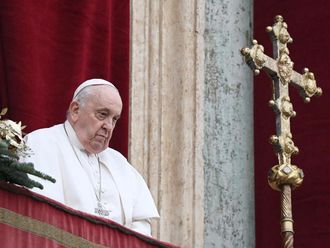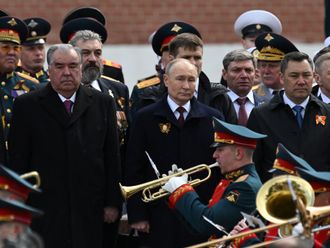Sofia: Bulgaria’s parliament on Friday approved making private pension contributions optional despite the junior coalition partners voting against a plan that has been criticised by the financial sector and brought Bulgarians out onto the streets.
Hundreds of protesters in downtown Sofia have called for the resignation of Finance Minister Vladislav Goranov over the past two days, fearing their pension savings will be swallowed up in an attempt to cover the country’s wide fiscal deficit.
Coalition partner the Reformist Bloc said on Thursday that if the plan passed, it would erode the trust between the parties — but stopped short of threatening to quit the government.
It, along with fellow coalition parties the leftist ABV and the nationalist Patriotic Front, voted against the plan. It passed with 120 members of the 240-seat parliament supporting the move, 57 against and 35 abstaining. The rest were absent.
“I do not see where the mistake is,” Prime Minister Boiko Borisov, of the GERB party, told BNT1 state television. “We give everyone a choice, there is nothing more democratic than that.” Bulgaria currently has a hybrid system, where a majority of savings go to the state system and a small part goes to private funds. Employers and workers make mandatory payments to both.
The new pension rules would apply to people born after 1959 and all new entrants to the labour market would have their second-pillar contributions directed to the state fund unless they picked a private fund within a year of starting employment.
Bulgaria’s state pension fund has been running huge deficits for years. For 2015 alone, the state budget will transfer some 2 billion levs to cover for the shortfall.
Businesses said the changes would deal a serious blow to private pension funds, the banks and the fledgling capital markets in the Balkan country — and criticised GERB for not explaining the changes before introducing them.
Private funds have accumulated 6.4 billion levs (Dh14.7 billion or $4 billion) in pension savings, invested in shares and bonds traded on Bulgaria’s bourse and abroad, and kept as bank deposits.
“These changes do not solve the problems [of the state pension fund], they deepen them,” Kaloyan Staykov of the Sofia-based Institute for Market Economics said. “There is a huge deficit in the system and the politicians are doing nothing.” President Rosen Plevneliev also expressed his concern, saying the system need to be analysed, explained and assessed.
However, there could be more changes ahead. Goranov said the government would remain open to a wider debate in the first three months of 2015 that could result in an option to opt out of the state fund and going back into private funds.












